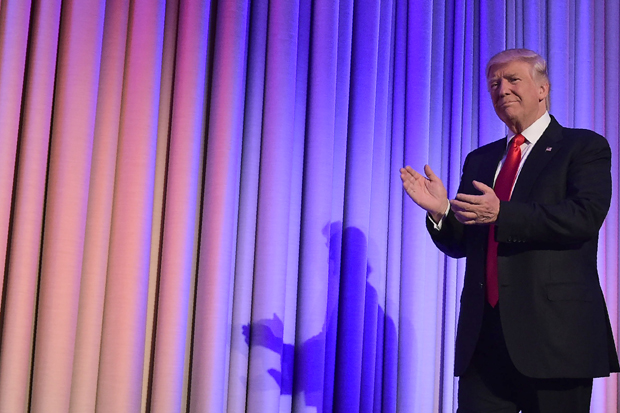I liked the generic title ‘Another Voice’ that The Spectator used to give this column, because it seemed to loosen the shackles imposed by more rigorous classification. The sort of journalism I tend to go in for is usually classified as ‘comment’ or ‘opinion’; but all too often these days my strong interest in what’s going on is not matched by any strong opinion about it, while my commentary amounts more to curiosity than comment.
For a few years now I’ve felt like this about our era’s weirdly censorious fascination with other people’s — and especially famous people’s — sexual behaviour. Those who consider their attitudes to be broadly liberal or progressive would doubtless bridle at the word ‘Victorian’, but there has been something distinctly Victorian about the fascination/repulsion displayed by the modern media whenever stories about harassment, rape, assault, paedophilia, or even (a new phrase I’ve yet properly to define for myself) ‘sexual touching’ surface.
The phenomenon that fascinates me is the fascination itself: our western fascination with the whole subject. I study it. And, though I may well be wrong, I half-sense that some kind of a sea-change is occurring. Sailors, apparently, talk about an ‘uncertain sea’ in conditions when the wind has swung around and the waves are trying to go both ways. Listening to the BBC and reading the popular press in recent weeks, I’ve seemed to sense just such an uncertain sea. Is ‘the public’ (whatever that entity may be) (a) shocked by the stories (or allegations) about past and present celebrities’ and politicians’ alleged sexual misdoings, and determined that no stone should be left unturned until justice is done; or (b) baffled and alarmed by the ‘witch-hunt’ that seems to be going on and scornful at the Mother Grundys in full cry against the supposed iniquities of famous people?
Take your pick if you like, but you don’t have to. I find myself pulled this way and that. Increasingly, I believe, so does the public and its news media.
I listened to the Today programme last Monday when Nigel Evans MP was protesting vigorously against what he sees as the injustice of his ever having been prosecuted in the first place. You could tell that his interviewer was unsure whether to adopt the voice and manner appropriate to the interview of a victim, or the prosecuting tone such a programme would employ towards a politician who had been accused of foolish behaviour (‘There’s no fool like an old fool,’ Evans had told the court). She tried a little of both approaches, but timidly.
And I’ve been reading in particular the Daily Mail, the Mail on Sunday, and the Sun over a period when a number of high-profile prosecutions of faded celebrities have failed with charges dismissed, while in other cases prosecutions have been successful. All three papers seem torn between making their dominating theme ‘shocking waste of taxpayers’ money’ or ‘shocking cover-up of appalling behaviour’.
Politicians, likewise, strike me in their pronouncements to have an ear cocked anxiously to a public mood they’re not sure they can divine. Are we to be coldly contemptuous of the prurience of the media, the police and the Crown Prosecution Service, or aghast at what we’ve been finding out about ourselves as a nation?
Now you may very well say we can be both, depending on the facts: angry at what we take (with the benefit of hindsight) to have been a frivolous prosecution, or angry at what we now know (with the benefit of hindsight) to have been outrageous and criminal behaviour. But the media reality is that with most waves of public indignation there has to be a prevailing mood: angry one way or angry the other. I don’t think we’d be railing against the CPS for prosecuting a trial involving alleged female genital mutilation, or alleged gender-specific abortion, or an allegedly greedy tax-evading banker, collapsed. When the case for deporting an alleged ‘preacher of hate’ fails, our complaint is against the failure to make the deportation stick, not the money wasted in the attempt. In both cases there is a prevailing media (and probably a prevailing public) mood.
My sense is that in the case of alleged sexual misbehaviour the public and media mood is, as I write, just on the turn. Child abuse is and remains complete anathema, but people are beginning to distinguish between (as they would see it) that kind of criminality, and the suggested criminality of inappropriate sexual advances.
Even with rape the public and its newspapers are keener than those who could be described as the nation’s opinion formers to distinguish between what your average minicab driver would call ‘real’ rape and ‘statutory’ rape. I doubt that Kenneth Clarke, when he suggested there might be different types of rape, was greeted by a public annoyance at his supposed ‘gaffe’ that reflected the response of more scolding voices. In this Mr Clarke may have been rather ahead of the press in his reading of the spirit of the age.
I’m honestly torn: torn between two strong dislikes. I detest viscerally all waves of moral indignation, and respond as Tom Macaulay did when he remarked that there was ‘no sight more ridiculous than the British public in one of its periodic fits of morality’. Yet I remind myself that slavery was ended by just such a fit and could probably not have been ended without it. I grow coldly scornful as we are enjoined to wax indignant about some now-forgotten media ‘personality’ allegedly taking (legal) advantage of teenage girls’ susceptibilities 40 years ago. Yet I remind myself that attitudes towards women when I was younger were pretty disgraceful, and to change them we perhaps need a bit of irrational passion in the other direction.
So I restrict myself to observation, mine being that an era of celebrity sex allegations may soon pass. ‘These are the days of miracles and wonders,’ sang Paul Simon of another time. Of our own, we may sing that these are the days of sexual show-trials. They may be coming to an end.
Got something to add? Join the discussion and comment below.
Get 10 issues for just $10
Subscribe to The Spectator Australia today for the next 10 magazine issues, plus full online access, for just $10.















Comments
Don't miss out
Join the conversation with other Spectator Australia readers. Subscribe to leave a comment.
SUBSCRIBEAlready a subscriber? Log in